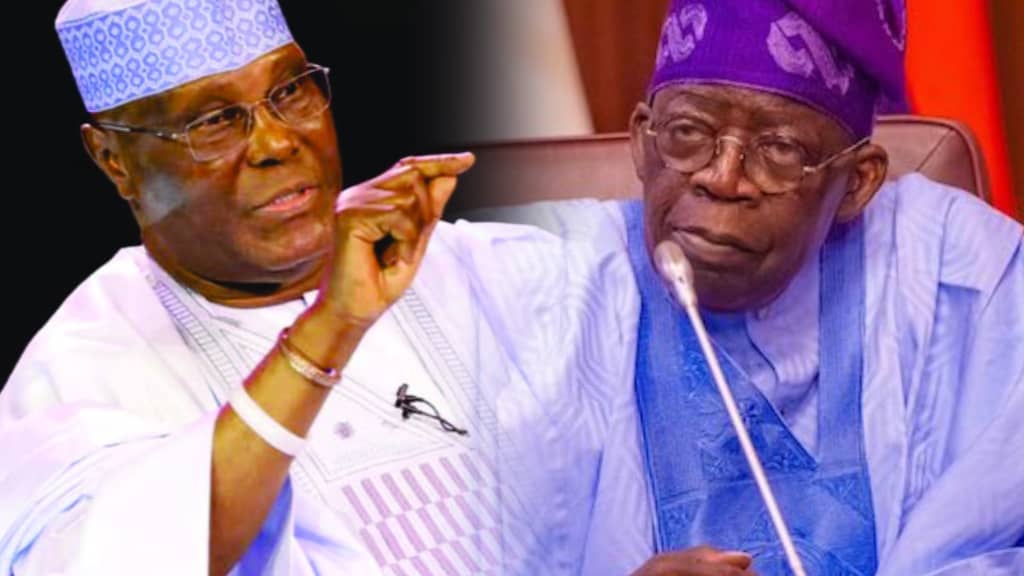Nigeria
Atiku Questions Tinubu Government Over Oando’s Expedited Approval in AGIP/ENI Deal

Former Vice President Atiku Abubakar calls on the Tinubu administration to clarify the swift approval granted to Oando in the AGIP/ENI deal, raising concerns about transparency and due process.
Atiku Abubakar, the Peoples Democratic Party’s (PDP) presidential nominee for 2023 has urged Nigeria’s Federal Government led by President Bola Tinubu to furnish a comprehensive clarification on Oando Plc’s swift acquisition of AGIP and ENI’s onshore assets.
According to reports, Oando has finalized the acquisition of all shares of Nigerian Agip Oil Company Limited. It has been suggested that this company is linked to President Tinubu’s nephew.
Oando Plc declared on Thursday that it takes immense pride in successfully concluding the procurement, which is a major accomplishment for the company.
Atiku’s Special Assistant on Public Communication, Phrank Shaibu, has accused Oando of receiving preferential treatment in the oil and gas sector. This has allegedly caused harm to other investors who may have been more qualified for such benefits.
While Oando’s deal was expedited, Atiku noted that the Shell/Renaissance and Mobil/Seplat deals faced protracted delays.
Part of the statement said that Atiku Abubakar, a former Vice President of Nigeria, has requested an explanation from the Federal Government regarding why Oando Plc – owned by the President’s nephew – was able to receive accelerated approval for purchasing AGIP and ENI onshore assets while other transactions like Shell/Renaissance deal and Mobil/Seplat continue facing delays.
During his travels, Tinubu went to the FMDQ in New York and also visited Qatar and France. However, during his visit to France he made false statements regarding the abolition of petrol subsidies. It is evident that this individual does not prioritize attracting foreign direct investment. Additionally concerning is his lack of courage in admitting that subsidies are being paid out, despite NNPCL acknowledging a debt owed by Nigeria’s government amounting to N7.8tn towards their national oil company.
The IMF foresees that subsidy payments will comprise 3% of the GDP, approximately $7.5bn this year, equivalent to around N11.8tn; nevertheless, petroleum scarcity persists due to obstructive measures from the Tinubu government against Dangote Refinery and its own NNPCL establishments. Without a doubt, it is evident that the subsidies have transformed into an extensive channel for directing finances towards financing political campaigns in 2027 elections.
“The ex-VP reaffirmed his claim that Oando was receiving unfair and preferential treatment in the oil and gas industry, at the expense of more capable investors.”
Atiku criticized the House of Representatives for their failure to take appropriate action regarding NNPCL. The company has been accused of attempting to transfer ownership of national oil assets to private individuals or groups, ultimately putting the country’s resources at risk.
In a span of only eight months, the Nigerian Upstream Production Regulatory Commission (NUPRC) greenlit Oando’s acquisition of ENI/AGIP onshore assets and Nigeria notably dropped all legal action against Shell/ENI in relation to the controversial OPL 245 scandal. Many have pointed out this exchange as a quid pro quo arrangement.
For the past three years, SEPLAT’s efforts to purchase Mobil’s onshore assets have been unsuccessful. Despite having a consent letter on Tinubu’s table, the deal has continued to stall. The potential transaction between Renaissance and Shell also faces delays. Only Oando’s deal has successfully gone through – which now begs us to question why it received accelerated approval.
In an ideal world, democracy should mean a government for the people, by the people and of the people. However, in Nigeria it seems that rather than being run with these principles at heart; it has become more like Tinubu’s personal regime – where everything is done to benefit him or his family members personally.
Atiku expressed worry about how the heads of crucial regulatory agencies in the oil industry were aiding Tinubu’s agenda.
He made a particular reference to the leaders of NNPCL, NUPRC, and NMDPRA, implying that their loyalty to the President guarantees their job security.
Along with his critiques on the economy, Atiku censured the Tinubu administration for what he perceived as a rise in violations of human rights. Specifically, he laid blame on the government’s use of law enforcement agencies such as police, DSS and military to curtail citizens’ liberties while pointing out cases where journalists were either detained or harassed at work. According to Atiku, there was an instrumentalization of 2015 Cyber Crime Prevention Act by current leadership solely aimed towards silencing critics who voiced dissenting opinions against their policies.
Atiku ended his statement by urging for prompt judicial intervention or release of persons like Bristol Tamunobiefiri, who are being held in doubtful circumstances. He stressed the importance of democracy serving all individuals rather than catering solely to a privileged few.
